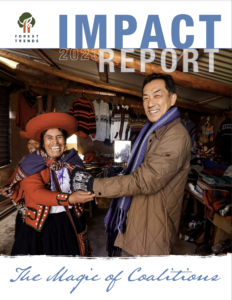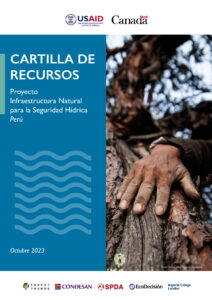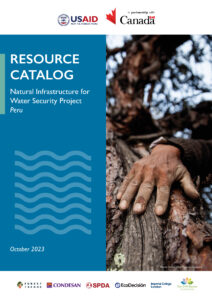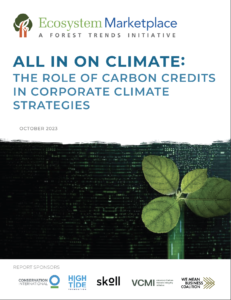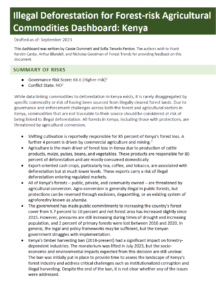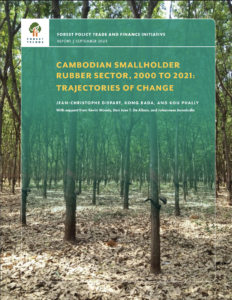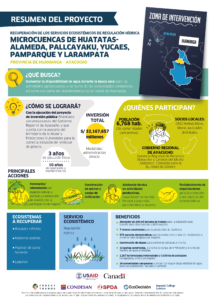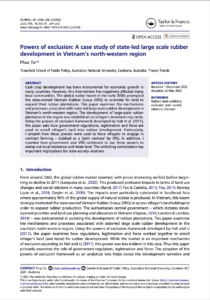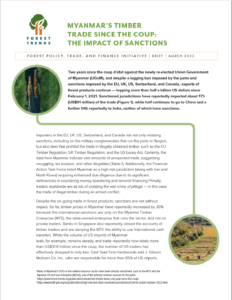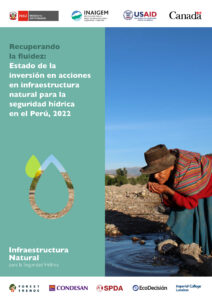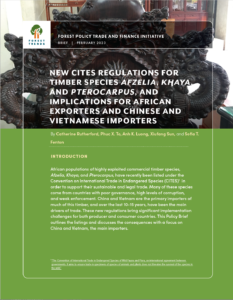Forest Trends Impact Report 2023
The Magic of Coalitions
Climate resilience, forest loss, the biodiversity crisis, the sustainable development imperative: none of these can be fixed through business as usual. None of these challenges will be addressed by individuals, individual institutions, nor individual countries. It will take all of us together. This is why we spend so much time investing in people and in […]
Cartilla de Recursos
Proyecto Infraestructura Natural para la Seguridad Hídrica
El Proyecto Infraestructura Natural para la Seguridad Hídrica trabaja para fortalecer la información, las herramientas y los mecanismos de implementación necesarios para escalar inversiones efectivas y equitativas en infraestructura natural para la seguridad hídrica. Esta cartilla comparte recursos clave a disposición del público, organizados en seis secciones: Estado del conocimiento sobre infraestructura natural para la[…]
Dependent Documents
All In On Climate: The Role of Carbon Credits in Corporate Climate Strategies
Ecosystem Marketplace is pleased to publish this 2023 report, All In On Climate: The Role of Carbon Credits in Corporate Climate Strategies, which serves as the first major update since 2016 to its landmark “Taking Stock” report series. When initially launched in 2015, the report illuminated for the first time the realities of how companies […]
Email Signup
Subscribe to any of Forest Trends’ mailing lists to keep up with the news, publications, and events that interest you.
Having Trouble?
If you experience any technical difficulties on our site, please contact Genevieve Bennett, Communications Manager.
Illegal Deforestation for Forest-risk Agricultural Commodities Dashboard: Kenya
By Cassie Dummett and Sofia Tenorio FentonWhile data linking commodities to deforestation in Kenya exists, it is rarely disaggregated by specific commodity or risk of having been sourced from illegally cleared forest lands. Due to governance and enforcement challenges across both the forest and agricultural sectors in Kenya, commodities that are not traceable to their source should be considered at risk […]
Cambodian Smallholder Rubber Sector, 2000 to 2021: Trajectories of Change
By Jean-Christophe Diepart, Kong Rada, and Kou PhallyIn Cambodia, rubber production plays a strategic role in the country’s agricultural development, influencing land use, employment as well as the overall export-orientation of the country’s agro-industry. While rubber production occurs on large-scale estates (Economic Land Concessions and privatized State-Owned Enterprises), the government has prioritized smallholder rubber production as a key contribution to the National […]
Ficha resumen del Proyecto Huamanga
Ficha resumen del Proyecto “Recuperación del servicio ecosistémico de regulación hídrica de las Microcuencas de Huatatas – Alameda, Pallcayaku, Yucaes, Pamparque y Larampata de la provincia de Huamanga, Ayacucho”.
Powers of exclusion: A case study of state-led large scale rubber development in Vietnam’s north-western region
By Phuc ToCash crop development has been instrumental for economic growth in many countries. However, this intervention has negatively affected many local communities. The global rubber boom in the early 2000s prompted the state-owned Vietnam Rubber Group (VRG) to scramble for land to expand their rubber plantations. This paper examines the mechanisms and processes associated with state-led […]
Myanmar’s Timber Trade Since the Coup: The Impact of Sanctions
By The Forest Policy, Trade, and Finance InitiativeTwo years since the coup d’état against the newly re-elected Union Government of Myanmar (UGoM), and despite a logging ban imposed by the junta and sanctions imposed by the EU, UK, US, Switzerland, and Canada, exports of forest products continue — topping more than half a billion US dollars since February 1, 2021. Sanctioned jurisdictions […]
Recuperando la fluidez: Estado de la inversión en acciones en infraestructura natural para la seguridad hídrica, 2022
By Eliana Cerdán Estrada, Mia Smith, Mirtha Camacho Hernández, Claudia V. Grados BuenoEste documento busca caracterizar la inversión, tanto pública como privada, que se ha realizado en nuestro país entre el 2008 y el 2021, en la temática de infraestructura natural y seguridad hídrica. Para ello, se han revisado diferentes bases de datos del Estado peruano, como el Invierte.pe, y la de la Agencia Peruana de Cooperación[…]
New CITES regulations for timber species Afzelia, Khaya, and Pterocarpus, and implications for African exporters and Chinese and Vietnamese importers
By Catherine Rutherford, Phuc X. To, Anh K. Luong, Xiufang Sun and Sofia T. FentonAfrican populations of highly exploited commercial timber species, Afzelia, Khaya, and Pterocarpus, have recently been listed under the Convention on International Trade in Endangered Species (CITES) in order to support their sustainable and legal trade. Many of these species come from countries with poor governance, high levels of corruption, and weak enforcement. China and Vietnam […]

